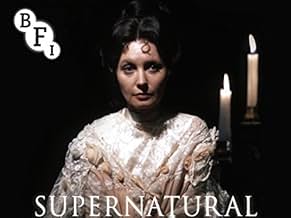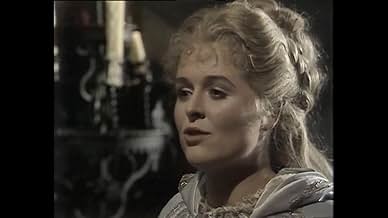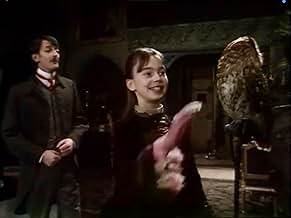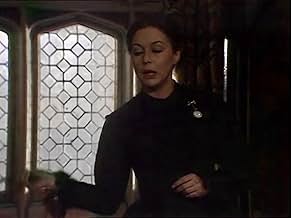Füge eine Handlung in deiner Sprache hinzuChilling anthology series where membership to the secret society, The Club of the Damned, is granted through telling horror stories.Chilling anthology series where membership to the secret society, The Club of the Damned, is granted through telling horror stories.Chilling anthology series where membership to the secret society, The Club of the Damned, is granted through telling horror stories.
Folgen durchsuchen
Empfohlene Bewertungen
Absolutely brilliant old BBC TV. This is the BBC during it's height, Golden Age Doctor Who, I Claudius, the M.R. James ghost stories, and it should be much more widely known. It features perhaps the creme de la creme of British acting talent at the time (Jeremy Brett, Billie Whitelaw, Robert Hardy, Denholm Elliott, Gordon Jackson - oh the cast is to die for!). Such was the talent avaliable at that time that each and every one of the main cast elevate the whole seriese far above what otherwise could have been fairly standard pop-horror, producing a real weight of gravitas and experience to the roles. The stories too however, are brilliant, I struggle really to pin point the best of the bunch, as I love them all. I have a certain soft spot for lurid, Victorianna-esque Gothic horror, I'm a sucker for it, so I'd probably like any of it. But "Night of the Marionettes" is especially good, due to the stark, amazing theatrical vivid quality to it with the genuinely unsettling marionette puppet show, shot on film as well, giving it a great, grimy, raw quality. I love also the two partner, "Countess Ilona" and "The Werewolf Reunion", largely because of the amazing cast surrounding it. A sordid collection of aristocratic monsters, Charles Kay playing a sneering snob who is little more than a grotesque sex pest, the other (played by Ian Hendry) an nihilistic war profiteer who booms his majestic voice across the hall espousing his beautiful misanthropic poetry, denouncing everything from religious faith to humanitarianism to peace, in between chuckling and stuffing his face perpetually with food. To the stuffy and uptight politician (Edward Hardwicke) a man so seemingly inhuman and robotic he feels more like an extension of the cold, glassy monocle he polishes repeatedly. Along with the foppish pianist played by Hugo Hoffman, they each get a gruesomely delicious fate, and it sparkles watching these actors, the peak of British acting talent bounce of one another, each unique in their personalities and personal philosophies, yet each acting like a kind of reflection of one another, all representatives of the casual culture of distain for humanity and disregard for women that marks this Prussian culture of aristocratic degeneracy and back stabbing grubby reactionarism.
Jeremy Brett too deserves special praise in "Mr. Nightingale". The story itself is very peculiar, yet he absolutely shines, doing what he would later master as Sherlock Holmes, every line shot out of his mouth like bullets from a Gatling gun, his teeth baring, his eyes bulging. He's just brilliant in how bizarre and malignant he can be.
The writing is also superb. It's very, very mid 70s BBC (anyone who watches Doctor Who or I, Claudius at the time will know exactly what I mean). Lots of harsh looking video, flare bulbs from bright lights, small sets like theatre, minimal camera movements, static shots of one or two actors. But I have to say It's brilliant for this series, the often highly loquacious dialogue being allowed to simply flow from the brilliant actors hired, allowing the poetic nature of it to drive the story. Atmosphere and tension and personal drama are at the forefront, not special effects (which, knowing the quality of some of that at the time, was probably wise).
It's a lost gem in my opinion, and should be far more widely known. I regularly rewatch it with a smile on my face, delighted by the weird cast of ghouls who come to recite their stories, diverse in their range and setting (and even period).
Jeremy Brett too deserves special praise in "Mr. Nightingale". The story itself is very peculiar, yet he absolutely shines, doing what he would later master as Sherlock Holmes, every line shot out of his mouth like bullets from a Gatling gun, his teeth baring, his eyes bulging. He's just brilliant in how bizarre and malignant he can be.
The writing is also superb. It's very, very mid 70s BBC (anyone who watches Doctor Who or I, Claudius at the time will know exactly what I mean). Lots of harsh looking video, flare bulbs from bright lights, small sets like theatre, minimal camera movements, static shots of one or two actors. But I have to say It's brilliant for this series, the often highly loquacious dialogue being allowed to simply flow from the brilliant actors hired, allowing the poetic nature of it to drive the story. Atmosphere and tension and personal drama are at the forefront, not special effects (which, knowing the quality of some of that at the time, was probably wise).
It's a lost gem in my opinion, and should be far more widely known. I regularly rewatch it with a smile on my face, delighted by the weird cast of ghouls who come to recite their stories, diverse in their range and setting (and even period).
BBC4 have been showing a handful of episodes of this long-lost supernatural anthology series from 1977, so here are my thoughts on individual episodes: VIKTORIA - the weakest story thus far, but not without a certain atmosphere. This is a family-based tale focused around a creepy life-sized doll and the strange girl who owns it. The story is worthy of note in featuring both Judy Cornwell (KEEPING UP APPEARANCES) and Lewis Fiander (DR JEKYLL AND SISTER HYDE) in strong roles as housekeeper and husband respectively, and an intricate little, character-focused storyline filled with twists and turns. It's not particularly frightening or stand out-ish, but it is creepy so that counts for something
NIGHT OF THE MARIONETTES - TV favourite Gordon Jackson stars as a scholar hot on the trail of Mary Shelley who falls foul of the strange proprietor of a roadside inn and his lifesize creations. The actress who plays the possessed daughter went on to become THE WOMAN IN BLACK in the long-lost '80s adaptation of that novel. This one is weird rather than scary, although it has some memorably weird highlights.
DORABELLA - the last of the series is also my favourite, thus far. It's a vampire story in which a couple of youthful men are the victims for a change; the gender reversal brings back fond memories of the likes of VAMPYRES and DAUGHTERS OF DARKNESS. This episode is quite remarkable for the way in which it builds a rich Gothic atmosphere and a sense of dread which go hand-in-hand throughout. It's visually beautiful, full of stunning imagery like jet-black carriages, desolate beaches and of course the expected creepy castles. All in all a great twist on the vampire legend.
NIGHT OF THE MARIONETTES - TV favourite Gordon Jackson stars as a scholar hot on the trail of Mary Shelley who falls foul of the strange proprietor of a roadside inn and his lifesize creations. The actress who plays the possessed daughter went on to become THE WOMAN IN BLACK in the long-lost '80s adaptation of that novel. This one is weird rather than scary, although it has some memorably weird highlights.
DORABELLA - the last of the series is also my favourite, thus far. It's a vampire story in which a couple of youthful men are the victims for a change; the gender reversal brings back fond memories of the likes of VAMPYRES and DAUGHTERS OF DARKNESS. This episode is quite remarkable for the way in which it builds a rich Gothic atmosphere and a sense of dread which go hand-in-hand throughout. It's visually beautiful, full of stunning imagery like jet-black carriages, desolate beaches and of course the expected creepy castles. All in all a great twist on the vampire legend.
This one was extra hard to get but eventually I did get my hands on clear complete set of this show....But it was well worth it...
Too bad it got cancelled early and was ahead of its time.
I highly recommend the following eps: 2. & 3. Werewolf Reunion and Countess Ilona: an excellent ep. with excellent acting especially from Billie Whitelaw. Interesting that the werewolf is not really shown fully but this adds to the flavour.
7. Night of the Marionettes: Gordon Jackson is just excellent in this ep.(he is just an excellent actor). An interesting twist on the Frankenstein story.
8. Dorabella: Dare I say probably the best ep. of the bunch. Excellent acting, story, atmosphere make this an original vampire tale and a very excellent twist ending.
Too bad it got cancelled early and was ahead of its time.
I highly recommend the following eps: 2. & 3. Werewolf Reunion and Countess Ilona: an excellent ep. with excellent acting especially from Billie Whitelaw. Interesting that the werewolf is not really shown fully but this adds to the flavour.
7. Night of the Marionettes: Gordon Jackson is just excellent in this ep.(he is just an excellent actor). An interesting twist on the Frankenstein story.
8. Dorabella: Dare I say probably the best ep. of the bunch. Excellent acting, story, atmosphere make this an original vampire tale and a very excellent twist ending.
I too vaguely remembered this from my childhood (even though none of my mates of the same age do) - specifically, images of a man with white eyes laughing creepily and a coffin full of maggots, both of which caused me a few sleepless nights as a 9 year old. I knew it was screened once in 1977 and never again, but all other information (especially in the pre-internet days) was scant to say the least. After a long, long search, I recently tracked down a copy of the complete series and, with the organ music and images of gargoyles on the titles just as I remembered them, I settled down to a nostalgia fuelled extravaganza.
So is this series some lost masterpiece? Sadly no. The few remembered images I mentioned above all come from the last episode 'Dorabella' which is the best of the lot by a country mile and is an offbeat vampire story with a genuinely creepy atmosphere. The rest are rather hit and miss, and at 50 minutes each, some of the extremely flimsy stories stretch well past breaking point. This is especially noticeable in the two part 'Countess Ilona/Werewolf Reunion' which could easily have been done and dusted in 30 minutes flat. At virtually 2 hours, it's almost unbearable.
Although it features a veritable who's who of British TV stars of the 70's (Billie Whitelaw, Ian Hendry, Robert Hardy, Gordon Jackson, Leslie Ann Down et al), production values on the series are noticeably low, with all the action happening in one or two sets per episodes and with the camera virtually fixed in one place. There isn't much in the way of a suspenseful soundtrack, and any sudden close ups or panned shots are invariably accompanied by an over the top blast of organ music. The stilted dialogue is rather wooden and pretentious too; the writer (Robert Muller) seems to have aspirations toward the MR James end of the horror market but sadly, his talent seems to suggest more of a Clive James, but without the wit.
Ultimately, the series is worth sitting through on it's own merits, and these just about drag it above the curiosity/novelty value of watching a long forgotten series, but I can't imagine anyone wanting to sit through them all again.
So is this series some lost masterpiece? Sadly no. The few remembered images I mentioned above all come from the last episode 'Dorabella' which is the best of the lot by a country mile and is an offbeat vampire story with a genuinely creepy atmosphere. The rest are rather hit and miss, and at 50 minutes each, some of the extremely flimsy stories stretch well past breaking point. This is especially noticeable in the two part 'Countess Ilona/Werewolf Reunion' which could easily have been done and dusted in 30 minutes flat. At virtually 2 hours, it's almost unbearable.
Although it features a veritable who's who of British TV stars of the 70's (Billie Whitelaw, Ian Hendry, Robert Hardy, Gordon Jackson, Leslie Ann Down et al), production values on the series are noticeably low, with all the action happening in one or two sets per episodes and with the camera virtually fixed in one place. There isn't much in the way of a suspenseful soundtrack, and any sudden close ups or panned shots are invariably accompanied by an over the top blast of organ music. The stilted dialogue is rather wooden and pretentious too; the writer (Robert Muller) seems to have aspirations toward the MR James end of the horror market but sadly, his talent seems to suggest more of a Clive James, but without the wit.
Ultimately, the series is worth sitting through on it's own merits, and these just about drag it above the curiosity/novelty value of watching a long forgotten series, but I can't imagine anyone wanting to sit through them all again.
When I first found this website about four years ago I remember trying to get information on THE SUPERNATURAL but there was none and it's only very recently someone has gone to the time and trouble of registering it . Hopefully someone can contribute more info at a later date .
As for myself I can remember bits of it . The title credits start with a blast of organ music with the camera panning across Gothic images of gargoyles . I remember it seemed very effective at the time when I was aged ten or eleven years old .
Each episode was self contained with someone being invited to an English Victorian club where they had to relate a true supernatural event in their life to be allowed membership and as with all these type of anthology stories they'd be a twist at the end . One of the stories was spread over two episodes and featured several gentlemen staying at a remote mansion in central Europe where a werewolf stalks them , another featured a doll that comes to life while another episode stars Gordon Jackson in a tale that reworks Frankenstien . It's interesting to note that this episode is unique in that the club members think this tale has no basis in fact , it's a made up story
The production values were typical of the BBC of the time , ie it was made rather cheaply with very obvious studio exteriors . I also recall letters to the Radio Times were very mixed with some viewers thinking THE SUPERNATURAL was a load of rubbish while some thought it was a fairly good drama . I personally liked watching it on a Saturday night but there again I was still only a child and it should also be pointed out that the BBC dropped the series after one season while the IMDb hasn't exactly been deludged with either info or reviews for this show which unfortunately may say something about its quality
Update Nov 2014 . After seeing the BBC 4 repeats it's as I suspected . Painfully slow , stagey acting and static directing and twists you can probably see a coming a mile away
As for myself I can remember bits of it . The title credits start with a blast of organ music with the camera panning across Gothic images of gargoyles . I remember it seemed very effective at the time when I was aged ten or eleven years old .
Each episode was self contained with someone being invited to an English Victorian club where they had to relate a true supernatural event in their life to be allowed membership and as with all these type of anthology stories they'd be a twist at the end . One of the stories was spread over two episodes and featured several gentlemen staying at a remote mansion in central Europe where a werewolf stalks them , another featured a doll that comes to life while another episode stars Gordon Jackson in a tale that reworks Frankenstien . It's interesting to note that this episode is unique in that the club members think this tale has no basis in fact , it's a made up story
The production values were typical of the BBC of the time , ie it was made rather cheaply with very obvious studio exteriors . I also recall letters to the Radio Times were very mixed with some viewers thinking THE SUPERNATURAL was a load of rubbish while some thought it was a fairly good drama . I personally liked watching it on a Saturday night but there again I was still only a child and it should also be pointed out that the BBC dropped the series after one season while the IMDb hasn't exactly been deludged with either info or reviews for this show which unfortunately may say something about its quality
Update Nov 2014 . After seeing the BBC 4 repeats it's as I suspected . Painfully slow , stagey acting and static directing and twists you can probably see a coming a mile away
Top-Auswahl
Melde dich zum Bewerten an und greife auf die Watchlist für personalisierte Empfehlungen zu.
- How many seasons does Supernatural have?Powered by Alexa
Details
Zu dieser Seite beitragen
Bearbeitung vorschlagen oder fehlenden Inhalt hinzufügen
























